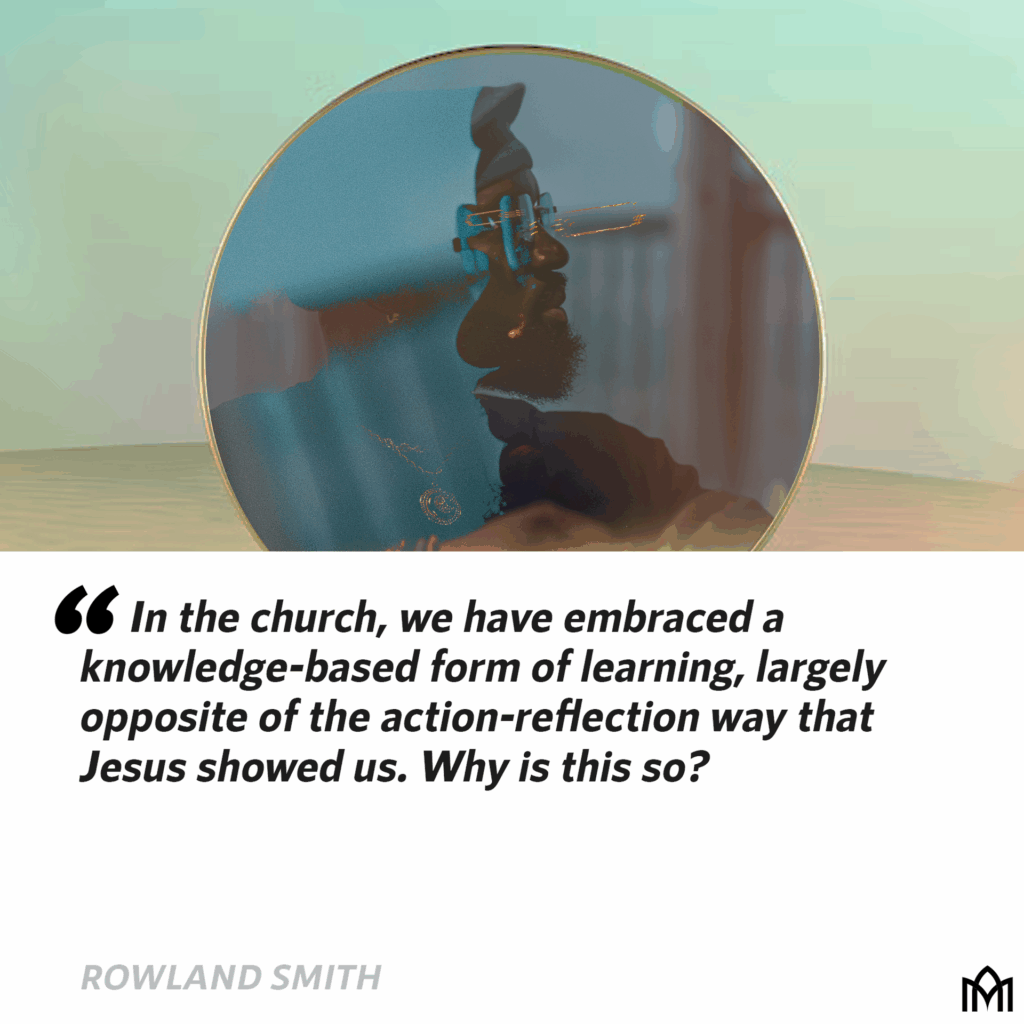An Action-Reflection Approach to Discipleship unto Jesus
When I was about seven years old, I received my first major physical injury. It was a cut that I had opened on my knee about 2 inches long, one that actually needed stitches. I acquired this battle wound of childhood by falling off my bicycle. My father had decided it was time to ditch the training wheels and learn to ride a bike the “real way,” so he grabbed a wrench, tore off the side-wheels, and put me on the seat. After running with me for about ten yards, he gave a slight push, followed by an affirming “You can do it,” and launched me 30 yards down our back alley. All was well for the first few seconds, until it wasn’t, and I was suddenly a bleeding mess on the pavement. My legs were wrapped clumsily around my my 3-speed with the ‘banana seat and butterfly handlebars’ (IYKYK!), and as I looked down at my knee, I saw an open wound bleeding profusely.
After the shock of my first crash, my dad asked me what I thought went wrong. I had some ideas and so did he, which we synthesized into a plan for the next ride. This was not the last time that I crashed on that bike, but I did learn how to ride it proficiently. Eventually, I could jump 4×8 sheets of plywood stacked on milk crates with the best of my friends. I mastered that bike, becoming a regular Evil Knievel in my neighborhood.
The point of this story is to illustrate a method by which we often learn things in life, from childhood into adulthood. If you think through your own life, I’m sure you can recall plenty of examples where you learned something new by trying it first and then reflecting on how it went. As we pass through our childhood, rarely do we read books, papers, or hear lectures as a primary means of learning before we do something. Sure, there are places where instruction, homework, and study come into play, but if you think about many things in life, we simply try them first.
Our entire life unfolds as we try things first: Crawling, Walking, Riding a Bike, Food, Skating, Bowling, Fishing, Football, Dating, Marriage, etc. There’s a long list we could make of things we experiment with to learn about them. In life, experience leads to learning. Even my three-year-old granddaughter, though she hasn’t yet learned how to read, opens her books and makes up stories based on the pictures. She does this naturally.
Thinking about this approach, I wonder: Why don’t we follow this natural methodology in the church?
When you stop to think about it, the Bible tells the story of Jesus throughout four gospels and describes a three-year journey he made with some disciples. His first words to them were, “Follow me,” not ‘Read this’ or ‘Show up to my lecture each week.’ Jesus asked his disciples to drop what they were doing and walk with him, learning by doing. Yet in the church, we have embraced a knowledge-based form of learning that is largely opposite the action-reflection way that Jesus modeled for us. Why is this so?
Greek/Roman vs. Jewish Learning Methods
Many of our approaches to life in the West, particularly in America, have Greek and Roman roots. This is also true in our preferred methods for learning. The graphic below illustrates this approach, which is a tool we use in our Forge America missional training to encourage ‘learning by doing.’
The Action-Reflection Tool © Forge America
The ‘Action-Reflection Tool’ above illustrates the following: If you have an idea you want to teach (Signified by the lightbulb at the top of the triangle), you have two approaches in how best to teach someone this concept:
- You can take the route of communicating facts, knowledge, and verbally explaining it (Illustrated by the graduate cap), and then HOPE that it translates into action (Represented by the bicycle).
or
- You can encourage living the concept first, experimenting with it, which will necessitate learning more about it. (We learn by way of the bicycle first, which will then lead to cognitive learning, aka the graduate cap.)
What we emphasize is that ‘Action leads to Reflection,’ rather than hoping ‘Reflection will cause Action.’
When we look at the methods of Jesus, a Jewish Rabbi, we observe him taking people on a journey, practically living out the Kingdom that he wants them to understand. Along the way, Jesus teaches verbally about this Kingdom that has come, but this cognitive knowledge is always connected to living it out every day. This approach was a very culturally Jewish way of teaching younger apprentices.
Yet in the church, we have embraced a very Greek/Roman approach to knowledge. We teach about Jesus and about the life he has taught his disciples, hoping it will translate and result in transformative action. Our highest value is often put on the pulpit and the 30-50 minutes each Sunday where people hear about Jesus. In this celebrated value of communicated knowledge, we unintentionally have taught people that knowledge about Jesus is the most important thing, at the expense of actually practicing a life lived like Jesus.
Jesus asked his disciples to walk with him, learning by doing. Yet in the church, we have embraced a knowledge-based form of learning that is largely opposite the action-reflection way that Jesus modeled for us. Why is this so? Share on X
Where to Experiment with Kingdom Foci
So, if we do want to shift our methods of discipling Jesus-followers, how do we integrate that into current church rhythms? I am blessed to be on staff at a church that is very focused outside the walls of our building, on what happens Monday through Saturday in people’s lives. For us, we found it helpful to shift several key approaches to how we ‘do’ church, which took quite a few years of practice before we began to see the fruit of these shifts. Five primary foci have changed:
- Our language changed. We shifted some of the primary words we used from the stage on Sundays. Kingdom became a major focus of our language, as opposed to a focus on salvation or sin (not that we don’t discuss these concepts). We started presenting an expectation that we were all engaged in the Kingdom in personal and corporate ways as a church family. Being a participant in God’s Kingdom is expected.
- Our budget increasingly reflected a Kingdom focus. We began a path toward giving away more than we spend on ourselves. This has been a very intentional push and has resulted in us reaching around 33% of our income being given away at present. We’re still shooting to give away a majority of 51% of our annual budget.
- We started using the word “sent” intentionally and often. John 20:21 tells us that Jesus taught his disciples that they were “sent” as the Father had sent Jesus. If we believe that Jesus actually said this, then why is this not primary for the majority of our discipleship programs? People that have been around our community for any time have heard that they are sent people and understand the implications of such.
- We started giving away expertise and funding to partners in our city and around the world. We envision our church as a large network of giftings and callings. We are not called to everything, nor can we do it as well as others, so we celebrate partnerships with other churches, organizations, and networks. We don’t “protect” our turf just to grow our own little kingdom.
- We consistently ask ourselves, “What should we NOT do” on Sundays. Our culture is ripe with consumer driven Sunday services that attract people through emotive worship and well-designed programs. This communicates a vastly different metric than “sentness.” What we measure first shows what’s important to us. If attendance and giving become our primary measurements of success, then our decisions will be based around becoming more successful in those ways. Our church community knows that Kingdom participation is our primary metric.
I want to note that we have not arrived with any of these foci and that this is a constant journey and struggle, especially as new people enter our church community. However, as someone who has been in pastoral ministry for thirty-five years at four different churches, and helps mentor churches around the country, our church’s culture is a very different animal than most attractional models we see today in America. It holds a different posture to God’s mission and to discipleship. Still, we have a long way to go.
In this celebrated value of communicated knowledge, we unintentionally have taught people that knowledge about Jesus is the most important thing, at the expense of actually practicing a life lived like Jesus. Share on X
Experimenting with Missional Activities
Another approach to help drive discipleship toward a missional life is to help people experiment individually with missional activities. Don’t start a mission class or yet another Bible study in hopes of persuading your community to engage a missional life, but instead help people do things outside the walls of your church building.
In other words: Take off the training wheels, put them on a bike, and let them crash! The key of course? Debriefing in safety afterwards. Here are six missional activities to get you started:
- Hold neighborhood gatherings and offer to buy the hot-dogs, beans, and dessert.
- Encourage small groups to be geographically focused, loving on their neighbors and engaging in life with them.
- Instead of a hosting a marriage class in the church, why not hold it at a library or community center and invite the surrounding neighborhood? Don’t make it about the church, but rather seek to serve marriages in the area.
- Start telling stories of missional activities that your people engage in. Celebrate their efforts as a new target for success.
- Find out from the city what the biggest needs of your community are, and then convene some other faith leaders to see how you can help fix these issues. After all, both the city and the church are in the “people business.”
- Start celebrating people’s everyday jobs as missional. Every month, we do “This time tomorrow” on stage. We ask a congregant to the stage on a Sunday morning and find out what they will be doing “this time tomorrow” in their everyday job. Then, we ask anyone else who is in a similar field to stand. We pray over these community members as an “everyday missionary” displaying the gospel in their work and everyday life. Mission becomes an every day of the week reality.
These are a few ideas we’ve tried in our own faith community. I’m sure you can come up with many more for your own context. Some ideas will work and some will fail. As people try things, live a missional life, stumble, fail, and run into cultural tensions, we have a perfect opportunity to teach, train, and walk with them toward a life that looks more and more like Jesus’ life did.
This is called discipleship.
How I Learned to Fly Fish
I remember wanting to learn how to fly fish when I was in my twenties. I read everything about it that I could find: Books on streams, fly-fishing gear, how to cast, and how to read a river’s water. I watched tv shows and instructional videos on fly fishing. However, in the wild I could never catch fish. It wasn’t until I met a friend of my father’s named Hardy Winburn that I became a fly fisherman. Hardy took me on the river, stood beside me and let me try to fly fish, as he encouraged and corrected me. I learned more from a year on the river with Hardy than in all the fly fishing books I’ve ever read.
As church leaders and disciple-makers, doesn’t it make sense to follow the patterns of our Teacher? Ironically, Jesus actually wanted to teach us to fish according to Scripture. My experience tells me that you won’t learn to fish simply by reading about it. To change our cultural impulse toward teaching knowledge first will require a big paradigm shift on our part. We’ll have to learn some new rhythms and risk a new way of doing things. I am convinced that this approach will lead to us seeing more disciples made. If we want our people to live lives saturated by the Way of Jesus, we need to live our own lives with them in the Way of Jesus. This happens best beyond a Sunday gathering.
Editorial Note: For more information on Forge America’s Action-Reflection tool and other tools, go to forge.teachable.com. ~CK
///
If we want our people to live lives saturated by the Way of Jesus, we need to live our own lives with them in the Way of Jesus. Share on X




